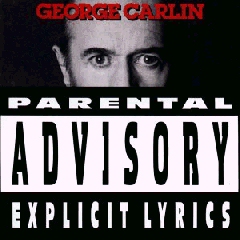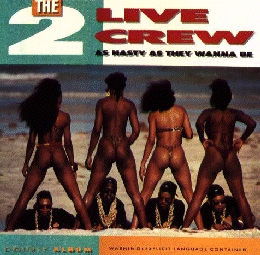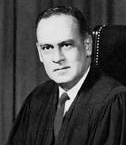Exploring Constitutional Conflicts
|
Introduction Regulation of Obscenity One of the most perplexing of all speech-related problems has been the issue of obscenity and what to do about it. A wide variety of tests have been employed by individual justices to determine what is constitutionally proscribable obscenity, and for long periods of time, no single approach commanded the support of a majority of the Court. The difficulty of defining obscenity was memorably summarized by Justice Stewart in a 1964 concurring opinion when he said: "I know it when I see it." Two presidential commissions have been formed to make recommendations on a national response to pornography. The first commission, The 1970 Lockhart Commission, recommended eliminating all criminal penalities for pornography except for pornographic depictions of minors, or sale of pornography to minors. Another commission appointed under President Reagan, the Meese Commission, came to a different conclusion, recommending continued enforcement of laws regulating hard-core pornography, even when only adults were involved. For the past three decades, the courts have been concerned almost exclusively with obscene visual images, not graphic verbal descriptions of sexual activity, but such was not always the case. The early and celebrated legal battles in this country sometimes involved what are now recognized as great works of fiction that included sexual themes: books such as James Joyce's Ulysses or D. H. Lawrence's Lady Chatterly's Lover. But it is important to remember that obscenity issues can still involve non-visual material, as demonstrated by a Florida prosecutor's decision to (unsuccessfully) try the rap group Two Live Crew for violating Florida's obscenity statute by singing rap songs with graphic sexual lyrics. The Supreme Court, in 1957, announced its decision in the important obscenity case of Roth v United States. In Roth, Justice Brennan writing for the Court concluded that obscenity--at best--only slightly furthered the values behind the First Amendment. The government's interest in preserving a decent society, the Court concluded, allowed it to prescribe obscenity. Nonetheless, the decision proposed a more speech-protective test for obscenity than the test used in earlier cases in which the government was allowed to focus on isolated passages. The Court required the government to prove that the average person, applying community standards, would find that the dominant theme, in the work taken as a whole, applied to prurient interests. In a subsequent opnion (Memoirs, 1966), the Court went so far as to say the work, to be found obscene, must be "utterly without redeeming social value," but that loose test proved unworkable when pornographers began sticking in a passage or two of Shakespeare. Miller v California sets out the "modern" test for obscenity. After years in which no Supreme Court opinion could command majority support, five members of the Court in Miller set out a several-part test for judging obscenity statutes: (1) the proscribed material must depict or describe sexual conduct in a patently offensive way, (2) the conduct must be specifically described in the law, and (3) the work must, taken as a whole, lack serious value and must appeal to a prurient interest in sex. What is patently offensive is to be determined by applying community values, but any jury decision in these cases is subject to independent constitutional review. Regulation of Four-Letter Words Certain words, the most notorious of which contain four-letters, are offensive to many people. Many other people, of course, are not offended by these same words and may in fact frequently use these words themselves. These very different reactions to indecent words, as well as to other references to sexual or excretory functions, make for potential conflict and--why else would I be typing this?--First Amendment conflicts. (Public attitudes to certain words and phrases even affects how this introductory note is written: merely by using a word such as "f- - -" in this note might cause certain Internet filtering software to render this educational page unavailable in certain homes, schools, and libraries.) The Supreme Court first confronted the issue of indecent (as opposed to obscene speech, which appeals to prurient interests) in the 1971 case of Cohen v California. Paul Cohen was convicted and sentenced to 30 days in jail for wearing in a courthouse corridor a jacket which, on its back, said "F - - - THE DRAFT" The Court reversed Cohen's conviction, finding his speech protected by the First Amendment. Writing for the Court, Justice Harlan noted that "one man's vulgarity is another man's lyric" and suggested that the First Amendment protects not just the intellectual content of speech, but the emotive content as well. In FCC v. Pacifica Foundation, the Court considered whether the Federal Communications Commission could, consistent with the First Amendment, punish a broadcaster who chose to play over the air at 2 o'clock on a weekday afternoon a twelve-minute "Filthy Words" monologue by George Carlin. In a narrow 5 to 4 decision, the Court upheld the FCC's authority to channel broadcasts containing indecent words to late-night broadcast hours when children are unlikely to comprise much of the audience. The Court based its holding on the lower level of First Amendment protection extended to broadcasting, the ability of broadcasts to zap listeners without warning in the privacy of their own living rooms, and the need to protect children from harmful speech. The dissenters, meanwhile, complained that the Court majority demonstrated "acute ethnocentric myopia." |
 Cover of a George Carlin album.
 Cover of the controversial album, As Nasty as They Wanna Be. 2 Live Crew members were acquitted in a 1990 Florida obscenity trial based on a performance at a Broward County nightclub.
The Cases Miller v. California (1973) Carlin Monologue at Issue in Pacifica 
JUSTICE POTTER STEWART:
HE KNEW PORNOGRAPHY WHEN HE SAW IT Questions
1. Could Paul Cohen have made his opposition to the draft as clear without using "the F word"? Would the message "I hate the draft" carry the same power and reach the same audience? Account of Announcement of Cohen Decision in The Brethren |
